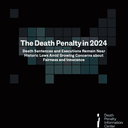
As President Biden considers his administration’s policy on the federal death penalty, his expressed opposition to the punishment may be buoyed by a new study that has found that “Americans support capital punishment less than they have at any time since the modern death penalty system was established in 1976.”
The polling analysis, conducted by University of North Carolina political science professor Frank R. Baumgartner and published August 3, 2021 in the Washington Post’s data feature “Monkey Cage,” reviewed 595 public opinion surveys administered between 1936 and May 2021 that asked respondents across the country about their attitudes towards capital punishment. To be included in Baumgartner’s analysis, a poll had to be administered on multiple occasions using identically worded survey questions. Then, using a mathematical technique called dyad ratios model, Baumgartner plotted the level of support for the death penalty over time (click here to enlarge graphic). Data from those polls, he said, show that support for capital punishment “has declined … to its lowest point since 1966.”
During the presidential campaign, candidate Joe Biden’s website posted a pledge to “work to pass legislation to eliminate the death penalty at the federal level, and incentivize states to follow the federal government’s example.” In his guest column in the Post, Baumgartner explained the potential significance of his findings to the administration’s decision making.
“If Biden wanted,” Baumgartner observed, “he could halt the federal death penalty for a generation with the stroke of a pen by commuting the sentences of the 46 people now on federal death row.” Noting the public’s historically low enthusiasm for capital punishment, he writes, “[i]f the president and his advisers think this would be unpopular, they are wrong. … As the Biden administration considers its next steps, officials will probably pay attention to public opinion, which now opposes the death penalty more than at any time in the previous 50 years.”
The Index of Public Support for the Death Penalty
Baumgartner’s analysis builds on a statistical index of public support for capital punishment he created in December 2015 based upon the results of 488 national surveys on the death penalty over the preceding 40 years. At that time, he found that “[t]he number of death sentences tracks closely with public opinion toward that form of punishment” and that the trends in increases or decreases in death sentences imposed closely tracked the changes in the index of public support for capital punishment.
Baumgartner set the baseline for his current index of support at the average of U.S. attitudes toward the death penalty from 1953 to 2021. In 1953, he says, support was “just above average,” falling over the next 13 years to 9.7 points below average in 1966, the low point in this period. Support for capital punishment then “trend[ed] unevenly but steadily upward to its high in 1997, with support for capital punishment nearly 20 points higher than in 1966,” at 10.3 points above average. However, Baumgartner writes, “public opinion toward the death penalty has soured even more quickly in the past two decades than it grew in the decades before,” declining to 9.2 points below average, its lowest level since 1966.
During the course of his analysis of the survey results, Baumgartner found that “[m]any of the polls worded the questions differently — and,” he says, “as in all polling, question wording matters a lot.” Two of the most frequently asked questions illustrate the impact, he says. First is the language of the Gallup poll question, asked 57 times during the time period Baumgartner studied: “Do you favor or oppose the death penalty for persons convicted of murder?” A second common way of measuring death-penalty support is: “What do you think should be the penalty for murder: The death penalty, or life imprisonment with absolutely no possibility of parole?”
When given the choice of a sentencing alternative, Baumgartner found that support for the death penalty registered 12 percentage points lower. The differences make assessing the true level of support for capital punishment more difficult, he says. But because the same questions are repeated over the course of many years, one can accurately assess trends and measure the relative level of support for the death penalty. By that measure, it is at its lowest point in more than a half-century.
Frank R. Baumgartner, If Biden abolishes the federal death penalty, he’ll have more support than you think, Washington Post, August 3, 2021.



